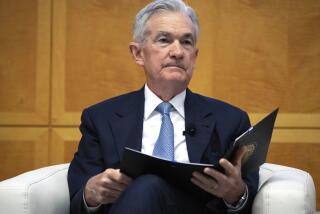IMF lowers U.S., world economic growth forecasts
WASHINGTON -- The International Monetary Fund on Tuesday lowered its forecast for U.S. and global economic growth this year, citing the European recession and reduced demand worldwide.
The world economy will grow 3.1% this year, the IMF said, down from its April projection of 3.3%. Growth also will be slower in 2014 -- 3.8% compared with an earlier 4% forecast.
The U.S. economy will grow 1.7% this year and 2.7% next year, both down 0.2 percentage points from the organization’s April World Economic Outlook forecast.
Part of the reason for the change in the U.S. forecast was the automatic federal spending cuts, known as the sequester. The IMF said those cuts have “weighed on improving private demand” in the U.S. and now are forecast to remain in place until 2014, longer than anticipated this spring.
QUIZ: How much do you know about the federal budget cuts?
But the pace of U.S. fiscal consolidation will slow, allowing growth to pick up next year, the IMF said. And the U.S. is doing much better than other advanced economies, which as a group are expected to grow just 1.2% this year and 2.1% in 2014.
“Private demand should remain solid, given rising household wealth owing to the housing recovery and still supportive financial conditions,” the IMF said of the U.S. economy.
The IMF projections are lower than new White House estimates.
The Office of Management and Budget said Monday that the U.S. economy would grow 2.4% this year and 3.4% in 2014, down from earlier projections. Those growth figures are in line with the latest forecast by the Federal Reserve, released last month.
Worldwide, the IMF said “appreciably weaker domestic demand and slower growth in several key emerging market economies” such as China and India were a drag on global economies.
Emerging markets and developing economies are forecast to grow 5% this year and 5.4% next year, both 0.3 percentage points lower than the April forecast.
In addition, “a more protracted recession” in the Eurozone was driving down economic demand. The IMF projects the region will remain in recession through 2013, contracting by 0.6% before weak growth of 0.9% returns in 2014.
The unemployment rate in the Eurozone was a record 12.1% in May as the single-currency region struggled with its longest-ever recession. The 17-nation zone has had six straight quarters of economic contraction through the first quarter of 2013.
ALSO:
Barnes & Noble CEO William Lynch resigns from bookseller
Majority of metro housing markets improving, trade group says
State Senate panel backs AT&T in clash on LifeLine phone service







